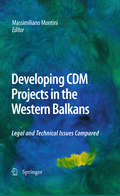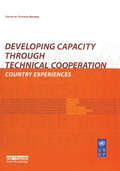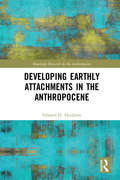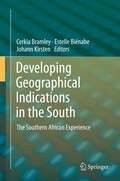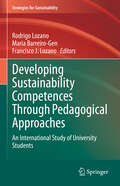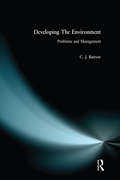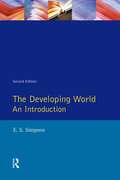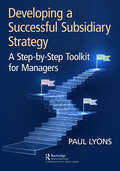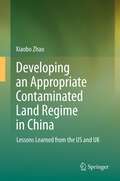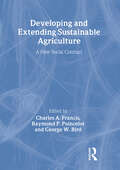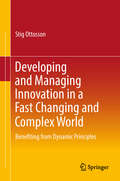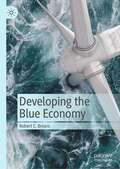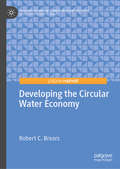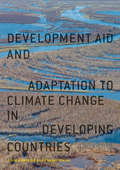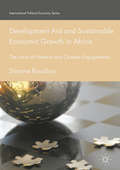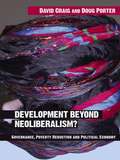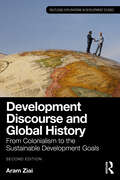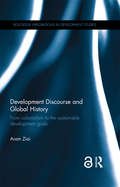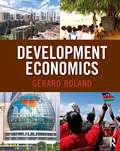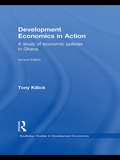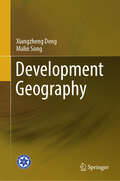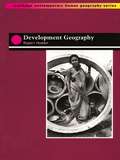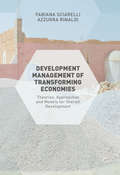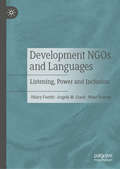- Table View
- List View
Developing CDM Projects in the Western Balkans
by Massimiliano MontiniDeveloping CDM Projects in the Western Balkans: Legal and Technical Issues Compared, arises from the professional practical experience gained by an interdisciplinary team of legal and technical experts acting in the framework of the environmental bilateral cooperation performed by the Italian Ministry for the Environment, Land and Sea in the Western Balkan countries, through the "Task Force for Central and Eastern Europe". The added value of the book consists in the fact that it jointly presents the real professional experience gained by a multi sectoral team of lawyers, economists, engineers and other technical experts, working in synergy with a shared vision. This volume will be useful not only to those specifically interested in the Western Balkan area, but represents a broader example of lessons learned in the development of CDM projects. Therefore, it may have a broad market among Government officials and legal-economic-technical professionals dealing with climate change issues as well as academics developing scientific research in this field.
Developing Capacity Through Technical Cooperation: Country Experiences
by Stephen BrowneTechnical co-operation involving northern experts transferring expertise to the south has not always worked. In fact it has sometimes been counter-productive, fostering a dependency on outside help rather than creating a genuine indigenous capability. This study by experts from Harvard University and the UN Development Programme (UNDP) uses a range of country studies to analyze what has worked in the past, what hasn't, and how to ensure that future co-operation results in genuine capacity building and ownership of the new capabilities by the recipients. It aims to offer a framework for evaluating different methods to achieve these goals. The volume is a companion to the earlier Capacity for Development, and should be useful for all those working in international development, as well as researchers, academics and students.
Developing Earthly Attachments in the Anthropocene (Routledge Research in the Anthropocene)
by Edward H. HuijbensThis book explores the development and significance of an Earth-oriented progressive approach to fostering global wellbeing and inclusive societies in an era of climate change and uncertainty. Developing Earthly Attachments in the Anthropocene examines the ways in which the Earth has become a source of political, social, and cultural theory in times of global climate change. The book explains how the Earth contributes to the creation of a regenerative culture, drawing examples from the Netherlands and Iceland. These examples offer understandings of how legacies of non-respectful exploitative practices culminating in the rapid post-war growth of global consumption have resulted in impacts on the ecosystem, highlighting the challenges of living with planet Earth. The book familiarizes readers with the implied agencies of the Earth which become evident in our reliance on the carbon economy – a factor of modern-day globalized capitalism responsible for global environmental change and emergency. It also suggests ways to inspire and develop new ways of spatial sense making for those seeking earthly attachments. Offering novel theoretical and practical insights for politically active people, this book will appeal to those involved in local and national policy making processes. It will also be of interest to academics and students of geography, political science, and environmental sciences.
Developing Geographical Indications in the South: The Southern African Experience
by Cerkia Bramley Estelle Bienabe Johann KirstenThis book contributes to the literature on Geographical Indications (GIs) by providing key theoretical reflections from a five-year review process on the potential of GIs for agri-food products in Southern Africa. The contributors reflect on diverse GI processes and dynamics which operate at the local, national and international levels, thus enriching the understanding of GI dynamics and of the variety of policy options available for GI protection in Southern countries. Following a discussion of the legal framework and governance of national GI schemes in Southern countries, the book emphasizes the main dimensions underlying the development of GIs and their potential for enhancing sustainable rural development and market access in particular. This provides the structure for the chapters that build on the different experiences of Southern African industries that have embarked on GI strategies. The book includes chapters on designing an appropriate legal framework and governance system for the development of GIs in Southern countries.
Developing Sustainability Competences Through Pedagogical Approaches: An International Study of University Students (Strategies for Sustainability)
by Rodrigo Lozano Maria Barreiro-Gen Francisco J. LozanoThere has been considerable progress in the incorporation of sustainable development into the curricula of higher education institutions. Study on these developments has included research on competences for sustainable development and pedagogical approaches to develop such competences. However, there has been limited research on the connection between how courses are delivered (i.e. pedagogical approaches) and how they may affect sustainability competences. This book examines pedagogical approaches for developing sustainability competences through comparing 17 higher education institutions from 13 countries, analysing how students&’ perception of how sustainability competences are being developed and which pedagogical approaches are being used for this purpose. This book brings together practice-based original research on the connection between developing sustainability competences and the pedagogical approaches used.
Developing The Environment: Problems & Management
by C J BarrowThis book presents a comprehensive overview of global environmental problems - past, present and future - examining their roots and implications and suggesting, where possible, ways in which they might be mitigated or avoided by careful management.
Developing World, The: An Introduction
by E. S. SimpsonAddresses the issues faced by developing nations in attempting to secure sustainable economic development.
Developing a Successful Subsidiary Strategy: A Step-by-Step Toolkit for Managers
by Paul LyonsMost books on business strategy approach the subject from a corporate perspective – covering topics such as the vision for the business, the marketplace, competition, differentiation etc. However, the reality is that most managers work in sub-units or subsidiaries of the business and they are not involved in corporate strategy formulation. Their strategic concerns are with the positioning and future trajectory of their own units within the complex internal ecosystem in which they exist. If these units are to survive and grow, the middle managers responsible for them must plan their future, maximize their value-add, and compete for resources within the internal market of their corporations. Such internal markets are becoming increasingly volatile due to general economic conditions, but also given the questioning of globalization and increasing corporate concerns about the frailties of international supply chains as brought into sharp focus by the Covid-19 crisis and the war in Ukraine. This book provides practical perspectives for these business unit managers, and a step-by-step toolkit that can be used by management teams to develop a successful subsidiary strategy that acknowledges these challenges while maximizing their contribution to corporate objectives. It is based on the authors 30 years of experience as an executive in a complex multinational (IBM) organization, supplemented by academic study at Masters and PhD level. The material covered has been verified through workshops over a 3-year period with the senior leadership teams of 25 multinational subsidiaries operating from Ireland.
Developing an Appropriate Contaminated Land Regime in China
by Xiaobo ZhaoLike all industrialized countries, China has encountered increasing problems with land contamination in recent years. Abandoned mining and manufacturing sites and obsolete industrial complexes, while also creating new polluting industrial enterprises, represent impending environmental threats. More importantly, a number of social and economic problems have developed and must be dealt with, in some cases urgently. Contaminated land laws and regulations have been established and have evolved in the US and UK and many other jurisdictions over the past few decades. These regimes have substantially influenced the relevant legislation in the context of numerous Asian and European countries and will inevitably benefit similar legislative efforts in China. This book is the first monograph that focuses on how China can learn from the US and UK with respect to contaminated land legislation and comprehensively illustrates how contaminated land law could be created in China. It will be of interest to academics and practitioners in environmental law in China, as well as the US and UK.
Developing and Extending Sustainable Agriculture: A New Social Contract
by Charles A. Francis George W. Bird Raymond P. PoincelotGet the latest sustainable agriculture practices and keep an eye on the future Developing and Extending Sustainable Agriculture: A New Social Contract explores the challenges faced by today’s farmers and ranchers to provide practical strategies to develop a twenty-first century system of sustainable agriculture that is economically sound, environmentally compatible, and socially acceptable. This comprehensive look at the current state of farming and ranching presents leading authorities discussing concepts and approaches in sustainable agriculture such as crop rotations, integrated pest management, alternative sources of nutrients to maintain productivity, and rotational grazing systems.Presently there is a trend toward a more industrial agriculture and a global food system that will bring long-term negative impacts. If farmers look thoughtfully toward the future, alternatives are now available to help solve these problems to provide agricultural sustainability for generations to come. Developing and Extending Sustainable Agriculture: A New Social Contract provides a model for integrated research and outreach to everyone interested in sustainable development. A sensible framework of practical short-term strategies are combined with visionary long-term plans to provide viable approaches to sustain agriculture, secure our food system, and develop a more equitable society for the future. The text includes several tables and figures, extensive references, and comprehensive bibliographies.Topics in Developing and Extending Sustainable Agriculture: A New Social Contract include: the evolution of the concept of equitable and sustainable development on-farm research farmer to farmer education IPM (integrated pest management) soil management managed grazing whole-farm planning, including economic analysis training for sustainable agriculture motivation theory and research to foster positive sustainable development organic farming productivity the future of sustainable agriculture much, much more Developing and Extending Sustainable Agriculture: A New Social Contract is enlightening, horizon-expanding reading perfect for educators, students, government decision makers, cooperative extension educators, specialists, administrators, citizen members of county extension boards, and administrators in land grant universities.
Developing and Managing Innovation in a Fast Changing and Complex World: Benefiting from Dynamic Principles
by Stig OttossonThis book provides essential insights into how to rapidly and safely develop new sustainable products, no matter whether it is in the private sector, the public sector or the non-profit sector, and regardless of the specific national or business culture.The principles discussed were distilled from experiences and insights gained in numerous practical innovation endeavors, and from insider action research in connection with ongoing development, change management, and innovation projects in various areas and branches of the business world and non-commercial sector.In short, the practical work and research has revealed that, regardless of the specific product and/or business to be developed, clear advantages can be gained by using dynamic or agile methods based on modern theories. These advantages include: reduced risk of failure, shorter time to market, less money and effort spent, better outcome solutions, etc. than when classical methods are used. Accordingly, the book also highlights the differences between the classical/traditional and dynamic mindset and approaches. It offers suggestions on how to think, organize, lead, and act in order to excel in an increasingly complex and non-linear world. The more you can assimilate the theories, principles and methods – and integrate them in the culture you operate in – the greater the benefits will be for you and your organization.
Developing the Blue Economy
by Robert C. BrearsTraditionally, the ocean economy is viewed solely as a mechanism for economic growth. In this business-as-usual approach, large-scale industrial economies have developed the ocean economy through the exploitation of maritime and marine resources, often without consideration of how those activities impact the future health or productivity of those same resources. This has led to aquatic ecosystems being viewed and treated as limitless resources; the marine environment becoming a dumping ground for waste; overfishing diminishing fishing stocks; ocean habitats being degraded from coastal developments; sea-level rise impacting coastal communities and infrastructure; increasing ocean acidification; and the marginalisation of poor coastal communities.Recognising the failings of the traditional ocean economy, there is a transition underway around the world towards the Blue Economy. This concept moves beyond the business-as-usual approach with economic development and ocean health complementary to one another. In the Blue Economy, the environmental risks of and ecological degradation from economic activity are mitigated or significantly reduced. Therefore, economic activity is in balance with the long-term capacity of the ocean ecosystems to support this activity and remain healthy and resilient. This book will provide an overview of the various technologies used to promote cross-sectoral and multi-scalar collaboration, facilitate the integrated management of sectors and resources, foster partnerships between governments and industry, encourage R&D in new technologies in resource use and management, and scale-up innovative financing mechanisms in the development of a Blue Economy. Also, the book will contain in-depth case studies that illustrate how locations, of differing climates, lifestyles and income levels, have implemented technologies to facilitate the development of the Blue Economy.Developing the Blue Economy will provide an accessible resource for practitioners and researchers working in the field on the various innovative technologies being implemented around the world to create a Blue Economy.
Developing the Circular Water Economy (Palgrave Studies in Climate Resilient Societies)
by Robert C. BrearsThis book presents new research on policy innovations that promote the development of the circular water economy. In contrast to the linear economy, the circular water economy promotes the reduction of water consumption, reuse of water, and recovery of resources from wastewater to not only increase resilience to climate change but also to reduce greenhouse gas emissions resulting from the provision of water and wastewater-related services. Providing a series of in-depth case studies of important locations in differing climates around the globe that have implemented a variety of policy innovations to develop the circular water economy, this book is a valuable resource for water and resource conservation managers, policymakers, international companies and organisations interested in the circular economy, environmental NGOs, researchers, as well as graduate and undergraduate students. · Systematically reviews policy innovations to develop the circular water economy· Illustrates how leading locations from around the world have developed the circular water economy to increase resilience to climate change while reducing emissions · Provides ‘best practices’ for other locations around the world aiming to implement the circular water economy
Development Aid and Adaptation to Climate Change in Developing Countries
by Carola Betzold Florian WeilerThis book examines development aid for climate change adaptation. Increasing amounts of aid are used to help developing countries adapt to climate change. The authors seek to discover how this aid is distributed and what constitutes the patterns of adaptation-aid giving. Does it help vulnerable countries, as donors promise, or does it help donors achieve economic and political gains? Set against the backdrop of international climate change negotiations and the aid allocation literature, Betzold and Weiler's empirical analysis proceeds in three steps: firstly they assess adaptation aid as reported by the OECD, then statistically examine patterns in adaptation aid allocation, and finally qualitatively investigate adaptation aid in three large climate donors: Germany, Sweden and the United Kingdom. With its mixed-method research design and comprehensive data, this work provides a unique, state-of-the-art analysis of adaptation aid as a new stream of development aid.
Development Aid and Sustainable Economic Growth in Africa
by Simone RaudinoThis book offers an original analysis of the long-term impact of western and Chinese economic and development cooperation policies in Africa. It argues that western Official Development Assistance (ODA) has failed to create viable and autonomous economies in beneficiary countries not (only) because of corruption, inefficiencies and cultural differences, but because it was never meant to do so. Raudino demonstrates, rather, that it was always designed to provide relief measures and nurture political relations rather than create genuinely industrialized and self-reliant economies. Similarly, by analyzing the nature of Chinese economic investments in Africa the author shows that China's governmental policies hardly represent a revolutionary departure from the cooperation standards set by the West. In making these observations he also taps into the broader question of why wealth continues to be generated unequally across the world. Based on extensive fieldwork, quantitative economic analysis and historical qualitative research, this thought-provoking work will appeal to students and scholars of politics, economics and development studies, as well as to those involved more directly in the aid process.
Development Beyond Neoliberalism?: Governance, Poverty Reduction and Political Economy
by David Alan Craig Doug PorterDevelopment’s current focus – poverty reduction and good governance – signals a turn away from the older neoliberal preoccupation with structural adjustment, privatization and downsizing the state. For some, the new emphases on empowering and securing the poor through basic service delivery, local partnership, decentralization and institution building constitute a decisive break with the past and a whole set of new development possibilities beyond neoliberalism. Taking a wider historical perspective, this book charts the emergence of poverty reduction and governance at the centre of development. It shows that the Poverty Reduction paradigm does indeed mark a shift in the wider liberal project that has underpinned development: precisely what is new, and what this means for how the poor are governed, are described here in detail. This book provides a compelling history of development doctrine and practice, and in particular offers the first comprehensive account of the last twenty years, and development’s shift towards a new political economy of institution building, decentralized governance and local partnerships. The story is illustrated with extensive case studies from first hand experience in Vietnam, Uganda, Pakistan and New Zealand.
Development Discourse and Global History: From Colonialism to the Sustainable Development Goals (Routledge Explorations in Development Studies)
by Aram ZiaiDevelopment Discourse and Global History introduces readers to the shifting ways in which people have been talking and writing about ‘development’ over time, and the rules governing the conversation.Drawing on the methods of Michel Foucault, Ziai’s ground-breaking book traces the origins of development discourse back to late colonialism and notes the significant discontinuities that led to the establishment of a new discourse and its accompanying industry. This book goes on to describe the contestations, appropriations and transformations of the concept over time. It shows that trends which have emerged since the 1980s, such as an emphasis on participation and ownership, sustainable development, and free markets, are incompatible with the original rules and so lead to serious contradictions. The Eurocentric, authoritarian and depoliticising elements in development discourse are uncovered, whilst still recognising its progressive appropriations. This new edition includes revisions throughout, and an important new chapter on race and racism, as well as a discussion of the evolution of the Sustainable Development Goals.This book is perfect for students and researchers in development studies, global history and discourse analysis as well as an interdisciplinary audience from international relations, political science, sociology, geography, anthropology, language and literary studies.
Development Discourse and Global History: From colonialism to the sustainable development goals (Routledge Explorations in Development Studies)
by Aram ZiaiThe manner in which people have been talking and writing about ‘development’ and the rules according to which they have done so have evolved over time. Development Discourse and Global History uses the archaeological and genealogical methods of Michel Foucault to trace the origins of development discourse back to late colonialism and notes the significant discontinuities that led to the establishment of a new discourse and its accompanying industry. This book goes on to describe the contestations, appropriations and transformations of the concept. It shows how some of the trends in development discourse since the crisis of the 1980s – the emphasis on participation and ownership, sustainable development and free markets – are incompatible with the original rules and thus lead to serious contradictions. The Eurocentric, authoritarian and depoliticizing elements in development discourse are uncovered, whilst still recognizing its progressive appropriations. The author concludes by analysing the old and new features of development discourse which can be found in the debate on Sustainable Development Goals and discussing the contribution of discourse analysis to development studies. This book is aimed at researchers and students in development studies, global history and discourse analysis as well as an interdisciplinary audience from international relations, political science, sociology, geography, anthropology, language and literary studies.
Development Economics
by Gérard RolandGerard Roland's new text, Development Economics, is the first undergraduate text to recognize the role of institutions in understanding development and growth. Through a series of chapters devoted to specific sets of institutions, Roland examines the effects of institutions on growth, property rights, market development, and the delivery of public goods and services and focuses. With the most comprehensive and up to date treatment of institutions on development, Roland explores the important questions of why some countries develop faster than others and why some fail while others are successful.
Development Economics
by Gérard RolandGerard Roland's new text, Development Economics, is the first undergraduate text to recognize the role of institutions in understanding development and growth. Through a series of chapters devoted to specific sets of institutions, Roland examines the effects of institutions on growth, property rights, market development, and the delivery of public goods and services and focuses. With the most comprehensive and up to date treatment of institutions on development, Roland explores the important questions of why some countries develop faster than others and why some fail while others are successful.
Development Economics in Action: A Study of Economic Policies in Ghana (Routledge Studies In Development Economics Ser. #79)
by Tony KillickFirst published in 1978, Development Economics in Action is a renowned study of policies in Ghana, one of Africa’s most closely watched economies. In this new edition three additional chapters provide a detailed account of 1978-2008.
Development Geography
by Xiangzheng Deng Malin SongThis book provides practical insights into regional development, focusing on how economic, social, and environmental factors contribute to disparities across regions. It examines pressing global issues such as income inequality, climate change, and sustainable growth, offering strategies for addressing these challenges in both developed and developing countries. The book combines theoretical frameworks with case studies, policy analysis, and interdisciplinary methods, making it both academically rigorous and highly applicable for real-world solutions. Key features include in-depth regional comparisons, climate adaptation strategies, and detailed policy recommendations. The reader will gain a comprehensive understanding of how to navigate the complexities of regional development and implement effective, sustainable policies. Ideal for scholars, policymakers, and development practitioners, this book is designed to inspire informed decision-making and foster balanced growth across regions.
Development Geography
by Rupert HodderDevelopment Geography is an informative and vibrant introductory level text, with a wealth of contrasting case-studies and illustrations. Written to stimulate critical thought and discussion about development, it does not assume any clear-cut distinction between 'developed' and 'developing' parts of the world. Case-studies highlight the problems and possible solutions at local, national and international scales. These include:* food production in Senegal* Disney in China* Hurricane Mitch in Honduras* corruption in Bulgaria* further studies from Russia, Bangladesh and Vietnam.Development Geography is the fifth book to be published in the popular modular text series Routledge Contemporary Human Geography.
Development Management of Transforming Economies
by Fabiana Sciarelli Azzurra RinaldiThis insightful book offers a new and innovative tool in the study of development. The authors propose 'The Overall Development Model' which provides a strategy for long-term, sustainable and adaptable development for countries around the globe. Starting with a comprehensive study into what development is and how it is achieved, Development Management of Transforming Economies critically analyzes current development schemes within transforming economies and examines their various actors both international and local, public and private. It examines the implementation of health, education and economic strategies of countries in Africa and Asia that have either undergone a development process, experienced slow but steady progress, or are just beginning to pursue a development strategy. In considering human development as a whole, the authors assert a new method of development that includes the developing population, and highlights the need for countries to define their own unique development process.
Development NGOs and Languages: Listening, Power and Inclusion
by Hilary Footitt Angela M. Crack Wine TesseurThis book addresses, for the first time, the question of how development NGOs attempt to 'listen' to communities in linguistically diverse environments. NGOs are under increasing pressure to demonstrate that they 'listen' to the people and communities that they are trying to serve, but this can be an immensely challenging task where there are significant language and cultural differences. However, until now, there has been no systematic study of the role of foreign languages in development work. The authors present findings based on interviews with a wide range of NGO staff and government officials, NGO archives, and observations of NGO-community interaction in country case studies. They suggest ways in which NGOs can reform their language policies to listen to the recipients of aid more effectively.
